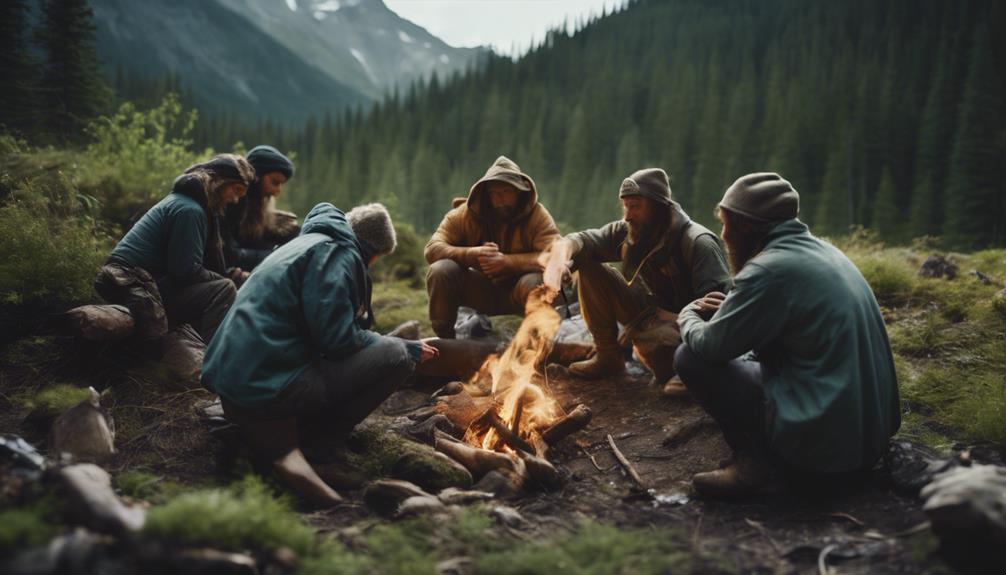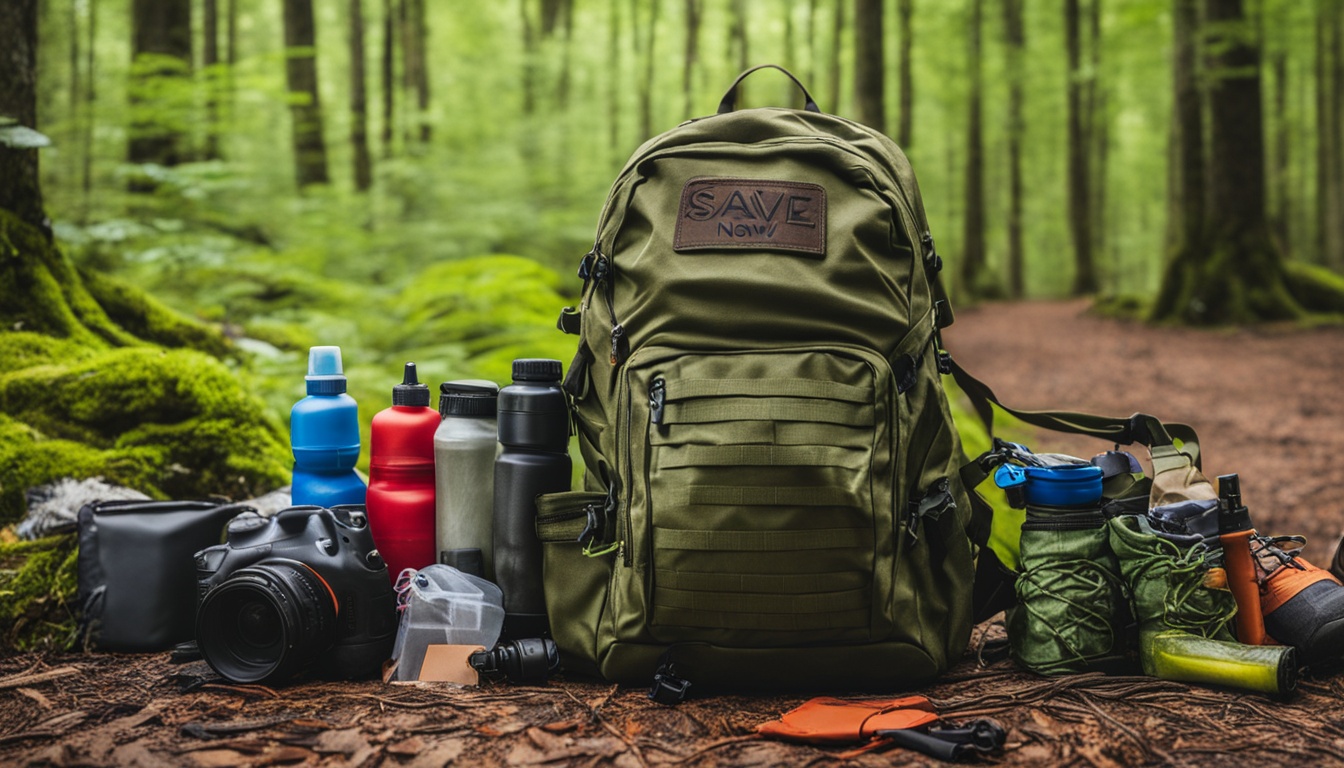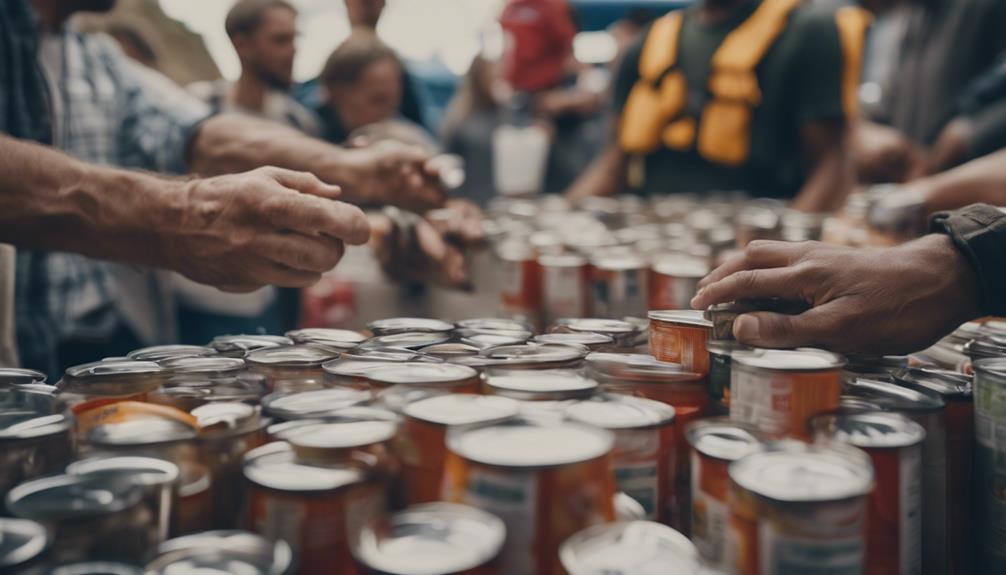As an adventurer, you need essential survival skills to navigate any wilderness challenge. Start with basic medical knowledge, such as first aid for wounds and fractures. Learn how to find food through foraging and basic hunting techniques. Master personal protection by building shelters and creating fires. It's crucial to understand evasion techniques, like quiet movement and environmental awareness, to avoid detection. Enhance your navigation skills using maps, compasses, and celestial bodies for direction. Finally, develop mental resilience to stay focused during tough times. Keep exploring to discover even more strategies for thriving in the wild.
Key Takeaways
- Master basic first aid techniques to manage injuries and prevent infections during outdoor adventures.
- Learn to identify edible plants and basic hunting skills for sustenance in the wild.
- Familiarize yourself with map and compass use for effective navigation and orientation in unfamiliar terrains.
- Develop stealth movement and environmental awareness to evade potential threats and remain undetected.
S.E.R.E. Overview
Understanding the S.E.R.E. framework—Survival, Evasion, Resistance, and Escape—equips you with essential skills to navigate life-threatening situations effectively. Each component plays a crucial role in your preparedness.
In Survival, you'll focus on medical knowledge, finding sustenance, personal protection, navigation, signaling for help, and planning your recovery.
Evasion sharpens your ability to move stealthily, ensuring you can avoid detection in diverse environments.
Resistance emphasizes mental and physical resilience, helping you endure hardships and withstand interrogations.
Finally, Escape teaches you strategies for extricating yourself from danger or captivity.
By mastering these elements, you'll enhance your capability to manage emergencies, making you more self-reliant and confident in unpredictable situations.
Embrace the S.E.R.E. framework to bolster your adventure readiness.
Fundamental Survival Skills
Mastering fundamental survival skills is essential for anyone venturing into the wilderness or unfamiliar environments. These skills can mean the difference between life and death.
You'll want to focus on three key areas:
- Medical Skills: Knowing how to treat injuries and illnesses can save lives. Learn basic first aid techniques like applying splints and dressing wounds.
- Sustenance: Familiarize yourself with food procurement methods, including identifying edible plants and basic hunting skills.
- Personal Protection: Understand how to create shelter, build a fire, and dress appropriately for different weather conditions.
Evasion Techniques

Stealth movement is essential for successfully evading detection in various environments. You need to master quiet movement techniques, whether you're in dense forests or bustling urban areas.
Start by practicing at home; walk softly, focusing on your footfalls and avoiding creaky floors. Familiarize yourself with your surroundings to identify potential hiding spots and escape routes.
Observe the terrain, noting how light and shadows can conceal your presence. When adapting your survival skills, always consider how to remain unnoticed, whether by blending into your environment or timing your movements with natural sounds.
Resistance Strategies
In survival scenarios, you must cultivate mental fortitude to resist despair and maintain your resolve against adversity.
Developing strong resistance strategies is essential for enduring tough situations and pressures. Here are three key tactics to enhance your resilience:
- Stay Focused: Keep your attention on your goals. Visualize success to combat negativity.
- Practice Mindfulness: Engage in breathing exercises and meditation to ground yourself and reduce anxiety.
- Build a Support Network: Surround yourself with trusted individuals who can provide encouragement and share survival experiences.
Escape Protocols

Understanding escape protocols is essential for maneuvering life-threatening situations, whether you're facing a natural disaster or captivity. You need to know how to plan, execute, and adapt your escape strategies. Familiarize yourself with basic detainment skills, like escaping handcuffs or ropes.
| Escape Steps | Key Considerations |
|---|---|
| Plan Your Escape | Identify potential exits and obstacles. |
| Gather Equipment | Collect tools like a knife or a flashlight. |
| Execute Quickly | Move swiftly and quietly to avoid detection. |
Always remember that escaping lawful detainment can have legal consequences, so be aware of your rights. Prioritize safety and preparation to enhance your chances of a successful escape.
Practical Medical Knowledge
Practical medical knowledge equips you with essential skills to treat injuries and manage health crises in survival situations. When you're out in the wild, knowing what to do can make all the difference.
Here are three key skills you should master:
- Wound Care: Learn how to clean, dress, and stitch wounds to prevent infection.
- Splinting: Understand how to immobilize fractures or sprains using available materials to reduce pain and prevent further injury.
- Basic First Aid: Familiarize yourself with CPR, how to recognize shock, and how to treat allergic reactions.
With these skills, you'll feel more confident and prepared to face medical emergencies, ensuring you can take care of yourself and others during your adventures.
Navigation and Signaling Skills

Mastering navigation and signaling skills is essential for ensuring your safety and guiding you back to civilization in unfamiliar terrain. To navigate effectively, familiarize yourself with a map and compass, and practice celestial navigation using the sun and stars. Always keep your sense of direction sharp by noting landmarks and natural features.
When it comes to signaling for help, carry a whistle, mirror, or flashlight to attract attention. Simple ground-to-air signals, like an SOS pattern, can make a significant difference. Remember to stay calm and be visible—use bright colors for clothing and equipment.
Using these skills, you'll not only enhance your chances of rescue but also boost your confidence in the wild.
Frequently Asked Questions
What Are the Best Survival Books for Beginners?
For beginners, you'll find "The Ultimate Survival Manual" by Rich Johnson and "SAS Survival Handbook" by John Lofty Wiseman invaluable. They cover essential skills, practical tips, and real-life scenarios to enhance your survival knowledge effectively. In addition to these, Bushcraft 101 by Dave Canterbury also provides a solid foundation in wilderness skills and outdoor techniques. These essential books for modern patriots not only focus on physical survival but also foster self-reliance and preparedness skills crucial for navigating today’s unpredictable world. Whether you’re a weekend adventurer or preparing for worst-case scenarios, these guides offer critical insights for any situation.
How Can I Practice Survival Skills at Home?
You can practice survival skills at home by setting up scenarios for first aid, making a shelter with household items, identifying edible plants in your kitchen, and simulating navigation using maps or online tools.
What Gear Is Essential for a Survival Kit?
Imagine being stranded, and you've got nothing! For your survival kit, pack a multi-tool, first aid supplies, water purification tablets, fire starters, a flashlight, emergency blanket, and non-perishable food. You'll be ready for anything!
How Do I Build a Fire in Wet Conditions?
To build a fire in wet conditions, gather dry tinder like bark or leaves, create a windbreak, and use a firestarter. Keep your kindling small, gradually adding larger wood as the flames grow.
What Are Common Myths About Wilderness Survival?
Did you know that 70% of people believe they can drink untreated water safely? Many myths about wilderness survival, like this one, can lead to dangerous situations. Always verify what you think you know before heading out.
Conclusion
As you gear up for your next adventure, remember that the real thrill isn't just in the breathtaking views or adrenaline rushes, but in the unexpected challenges that test your survival skills.
Isn't it amusing how the more prepared you are, the less you actually need those skills?
Yet, embracing the irony of preparation guarantees you can confidently tackle whatever comes your way, turning potential disasters into mere anecdotes of your triumphant journey.
Happy adventuring!










